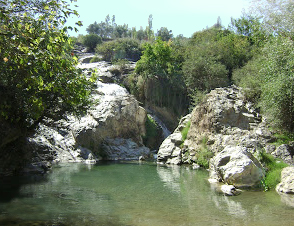Pactolus(Greek:Πακτωλός), also calledChrysorrhoas(Χρυσορρόας), now namedSart Çayı,is a river near the Aegean coast ofTurkey.The river rises fromMount Tmolus,flows through the ruins of the ancient city ofSardis,and empties into theGediz River,the ancientHermus. The Pactolus once containedelectrumthat was the basis of the economy of the ancient state ofLydia,which used the naturally occurring alloy of gold and silver to forge thefirst coinsunderAlyattes of Lydia.

Name
editPseudo-Plutarchin theDe fluviiswrite that the river was initially called Chrysorrhoas (Χρυσορρόας; meaning "streaming with gold" ) because according to the legend, Chrysorrhoas (the son ofApollo) threw himself into the river.[1][2]
Later it was called Pactolus, from Pactolus, the son ofLeucothea,who during a festival ofAphroditefailed to recognize his own sister,Demodice,and ravished her. Upon realizing what he had done, overwhelmed with grief, he threw himself into the river. Because of this the name of the river changed from Chrysorrhoas to Pactolus.[2]
Legend
editAs ariver-god,Pactolus was said to be the brother of another riverHydaspes,[3]and thus, offspring of theTitansOceanusandTethys.[4]He was the father ofEuryanassa,one of the possible mothers ofTantalus’ children.[5]
The only myth where Pactolus was an active participant is recounted inNonnus’Dionysiacadetailing the young god,Dionysus,in hisIndiancampaign.According to legend, KingMidasdivested himself of the golden touch by washing himself in the river.[6]The historianHerodotusclaimed that the gold contained in the sediments carried by the river was the source of the wealth of KingCroesus,son of Alyattes.
InSophocles'Philoctetes,the chorus recognizesGaiaas ruler of the "golden stream Pactolus."[7]
Propertius 1.6
editThe river is mentioned in Sextus Propertius' Elegy 1.6.
"at tu seu mollis qua tendit Ionia, seu qua Lydia Pactoli tingit arata liquor..."
( "But wherever either soft Ionia extends, or wherever the water of the Pactulus stains the Lydian fields..." )[8]